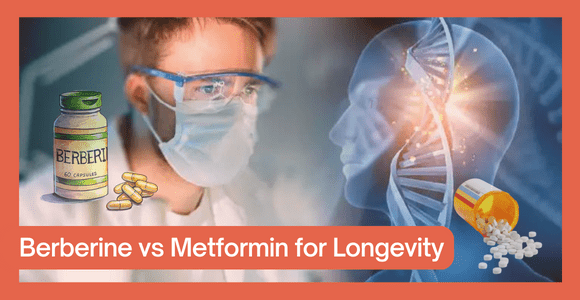Berberine and metformin are two of the most prominent supplements used to control blood sugar levels, as well as other health conditions. Both have been proven effective in improving insulin sensitivity and reducing blood sugar concentration; however, their means of action differ greatly with varying potential side effects.
Berberine is an all-natural ingredient found in certain plants which can be taken orally or applied topically; whereas metformin serves primarily as a prescription medication for treating type 2 diabetes.
According to a big review of 14 studies, berberine is as effective as oral diabetes drugs, including metformin, glipizide, and rosiglitazone.
Table of Contents
What are Metformin and Berberine?
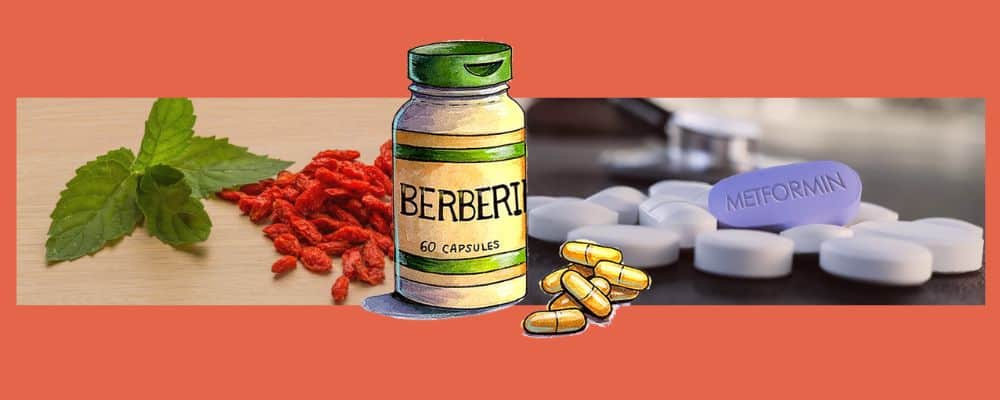
Metformin, sometimes incorrectly spelled “metaformin”, is derived from French lilac. So what does it do? While some individuals use this medication for weight reduction or PCOS, its primary purpose is to regulate blood glucose levels in people who have type 2 diabetes.
Significant clinical trials and research have been conducted that prove the efficacy of Metformin in achieving this goal. Metformin works by increasing the activity of an essential enzyme, AMPK.
For centuries, Berberine – a natural compound found in plants such as Barberry, Goldenseal, and Coptis or Goldenthread- has been utilized within traditional medicine to treat many diverse ailments.
Nowadays it is commonly used as a supplement for numerous health issues like elevated blood sugar levels, high cholesterol levels, weight loss management, and other medical conditions. The two compounds share some general effects.
Berberine is renowned for its numerous health benefits, including reducing blood sugar levels, heightening insulin sensitivity, decreasing cholesterol levels, and promoting weight loss. As these results are still being investigated by medical experts, it’s essential to always take berberine with the supervision of a healthcare provider before use.
Metformin and Berberine supplements have both been found to potentially aid in weight loss, heart health, and a variety of other conditions; however, more research is needed to validate their efficacy and security.
Berberine can be as effective as controlling blood sugar levels as metformin. By taking berberine supplements in conjunction with an appropriate diet and physical activity, managing your blood sugar levels can be just as effective as relying solely on metformin.
Comparing Berberine vs Metformin
Above we discussed how Berberine and Metformin may both aid in sustaining balanced blood sugar levels. Not only that, but they also act similarly when it comes to cellular processes.
Specifically, these two compounds have a tendency of activating the AMPK enzyme – which is triggered by low-energy activities such as fasting or exercise.
Metformin has very good bioavailability of 40 to 60%, and gastrointestinal absorption is apparently complete within 6 hours of ingestion. Despite such potential, however, the bioavailability of berberine is far less than 1% due to poor absorption and efflux by P-gl.
Accordingly, an explosive level of research has been devoted in the last two decades to improving the efficacy of berberine by various means.
| Benefit | Berberine | Metformin |
|---|---|---|
| Lowering blood sugar levels | Yes | Yes |
| Lowering cholesterol levels | Yes | No |
| Improving insulin sensitivity | Yes | Yes |
| Weight loss | Yes | Yes |
| Reducing inflammation | Yes | No |
| Improving heart health | Yes | No |
| Increasing longevity | Yes | No |
| Antimicrobial properties | Yes | No |
| Available as a supplement | Yes | No |
| Prescription medication | No | Yes |
Cells power up AMPK to access more energy, allowing them to take in the glucose and fatty acids from the blood. Additionally, this helps cells break down fat and glycogen while restraining glucose and fat storage.
AMPK activates enzymes in two distinct ways. First, it directly phosphorylates proteins to deliver rapid results. Second, its transcription factors have the power to impact enzymes over a longer period of time.
Metformin and Berberine are effective at consuming glucose by inhibiting complex 1 of the electron transport chain, making ATP production less efficient. This mimics a calorie-restricted diet in terms of energy use, leading to improved health outcomes. Studies have shown that berberine may be used to replace metformin, at least partially.
How to Take Berberine with Metformin?
Can You Take Berberine On an Empty Stomach? It is suggested that you take berberine half an hour before meals to boost its bioavailability. Several studies have demonstrated that taking berberine on an empty stomach or prior to a meal may be the most effective way of consuming it.
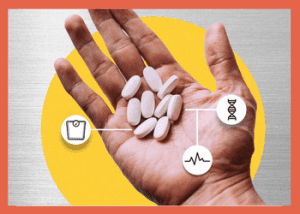 You don’t need to always include berberine in your mealtimes, but just remember to give yourself a thirty-minute gap beforehand for maximum efficiency.
You don’t need to always include berberine in your mealtimes, but just remember to give yourself a thirty-minute gap beforehand for maximum efficiency.
To reap the most benefits from taking Berberine and Metformin together, consider adhering to these helpful tips:
- Consult with a healthcare professional: Your doctor will work with you to determine the right dosage and usage of Berberine and Metformin according to your health condition and medical background.
- Start with low doses: To begin, try a small dosage of both Berberine and Metformin, gradually raising the dose as you become more accustomed to it.
- Take at different times of the day: To minimize the chance of adverse reactions or interactions, it is recommended to take Berberine and Metformin at different portions of your day.
- Monitor blood sugar levels: It is essential to always monitor your blood sugar levels to make sure that Berberine and Metformin are working correctly and don’t have any negative effects on your glucose levels.
- Be aware of potential interactions: It is essential to tell your healthcare provider of any medications and supplements you are taking before taking Berberine, as it may interact with certain drugs.
- Be aware of potential side effects: Be cognizant of the probable negative impacts of both Berberine and Metformin, ceasing use if essential.
More research is required to confirm the extent to which Metformin and Berberine can extend lifespan. Both metformin and berberine for weight loss have shown positive results in studies. Metformin, primarily prescribed to those with type 2 diabetes, has a surprising side effect: encouraging fat burn-off.
It works by decreasing glucose production in the liver, diminishing sugar consumption through the gut, and augmenting insulin sensibility – all of these mechanisms are thought to play significant roles in helping people who struggle with obesity or overweight problems achieve their desired results.
Berberine Dosage for Anti Aging
- To experience the anti-aging benefits of berberine, it is recommended to take a daily dose of 500-1000 mg.
- For optimal effectiveness, it is recommended to divide the dosage into two or three smaller doses taken throughout the day.
- Before beginning any new supplement plan, it is always beneficial to consult with a healthcare specialist, particularly if you are currently experiencing health issues or taking any medications.
- It is imperative to share with your healthcare provider which medications you are taking before beginning a berberine supplement, as it can interact with certain drugs.
- To experience the advantages of berberine on the skin, you must be patient and stay committed to your supplement regimen; it could take several weeks for results to become visible.
Metformin Dosage for Anti Aging
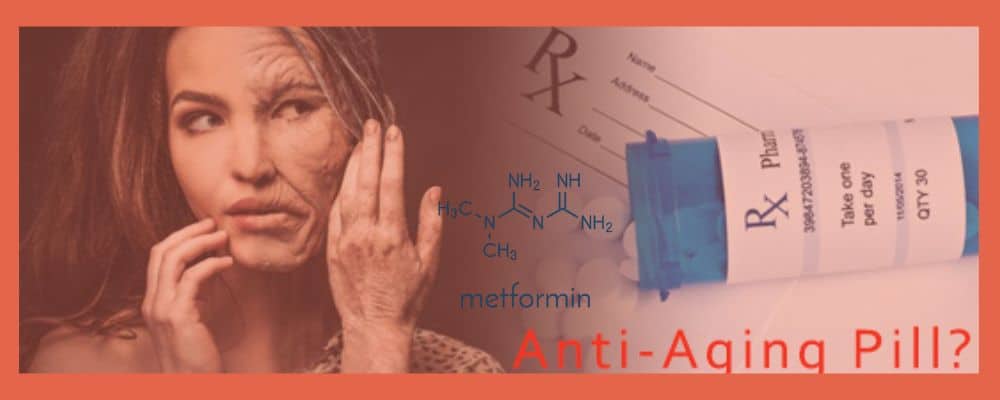
- To reap the anti-aging benefits of metformin, it is advisable to consume 500-2000 mg of the drug daily.
- To maximize the effectiveness of your medication, it is recommended to break up the dosage into two or three segments spaced throughout the day.
- Before you start any new supplement regimen, it is wise to consult with your doctor or healthcare provider. This is especially important if you have pre-existing medical conditions, are taking medications regularly, or if this is your first time using supplements.
- Before taking any metformin supplement, it is imperative to make your healthcare provider aware of all prescription medications you are currently on in order to avoid potential drug interactions.
- When taking metformin, it could take several weeks to experience the skin benefits that come with it. Therefore, you must remain consistent and patient while waiting for results.
It’s important to be aware that Metformin requires a prescription and should always be taken under medical supervision, as side effects are possible. Additionally, this drug has not been officially authorized by the FDA for anti-aging purposes.
Side Effects of Metformin and Berberine
| Side Effect | Metformin | Berberine |
|---|---|---|
| Nausea, vomiting, diarrhea | Common | Mild gastrointestinal upset (nausea, diarrhea) |
| Abdominal pain | Common | Constipation |
| Loss of appetite | Common | Headache |
| Fatigue | Common | Fatigue |
| Dizziness | Common | Dizziness |
| Lactic acidosis (rare) | Rare | – |
| Hypoglycemia (low blood sugar) | Rare | – |
| Vitamin B12 deficiency (rare) | Rare | – |
| Interaction with certain medications | Common | – |
Notably, these side effects are typically mild and have no cause for alarm. But if you experience any serious side effects or have existing medical issues, it’s best to seek advice from a healthcare provider before taking these supplements.
Berberine vs Ozempic
Berberine and Ozempic are two distinct compounds used in the management of diabetes, but they have different mechanisms of action, benefits, and considerations. It’s important to understand their differences before making a decision about which one might be more suitable for your needs.
Berberine is a natural compound found in various plants, including the barberry shrub. It has gained attention for its potential to lower blood sugar levels and improve insulin sensitivity, making it a popular choice among those seeking natural alternatives for diabetes management. Berberine works by activating an enzyme called AMP-activated protein kinase (AMPK), which helps regulate energy balance and glucose metabolism in cells. Additionally, berberine has been associated with reducing inflammation, improving lipid profiles, and supporting cardiovascular health.
Ozempic, on the other hand, is the brand name for semaglutide, a prescription medication approved for the treatment of type 2 diabetes. It belongs to a class of drugs called GLP-1 receptor agonists. Ozempic works by mimicking the action of the hormone GLP-1, which increases insulin secretion, decreases glucagon release, slows stomach emptying, and promotes a feeling of fullness. These actions collectively lead to lower blood sugar levels, reduced appetite, and potential weight loss. Ozempic also has cardiovascular benefits, as it has been shown to reduce the risk of major adverse cardiovascular events in people with diabetes.
When comparing Berberine and Ozempic, several factors come into play. Berberine is available as an over-the-counter supplement, making it accessible without a prescription. However, its efficacy might vary among individuals, and it may not be as potent as prescription medications like Ozempic. Ozempic, being a prescription medication, requires consultation with a healthcare provider and is typically recommended for individuals with uncontrolled blood sugar levels despite other interventions.
Both options have their advantages and considerations. Berberine offers a natural approach, but its effects might be milder and less predictable compared to a prescription medication like Ozempic. Ozempic, backed by extensive clinical trials, provides a stronger and more targeted approach to diabetes management, especially for individuals who require more robust blood sugar control.
In making a decision, it’s crucial to consult with a healthcare professional who can assess your individual medical history, current health status, and treatment goals. Factors such as your overall health, medication interactions, and potential side effects should be carefully considered. Ultimately, the choice between Berberine and Ozempic depends on your specific needs, preferences, and the guidance of a qualified medical practitioner to ensure the most effective and safe diabetes management strategy.
Frequently Asked Questions
Is it Safe to Take Berberine With Metformin?
If you are considering adding berberine and metformin to your supplement regimen, it is typically safe to do so. However, always consult with your healthcare professional for advice on the best dosage and usage of these supplements based on your medical history and specific needs.
Taking this extra step will ensure that you get the most out of them while minimizing any potential risks or interactions.
Is Berberine as Good as Metformin for Anti-Aging?
Berberine has demonstrated efficacy in improving skin health and exhibiting positive effects on other markers of aging, including cholesterol levels and blood sugar.
On the contrary, metformin is primarily used to treat type 2 diabetes but also boasts anti-aging properties through AMPK activation that yields a longer life span. Thus, it would be inconceivable to conclude which one performs better than the other without further research.
How Much Berberine Should I Take With Metformin?
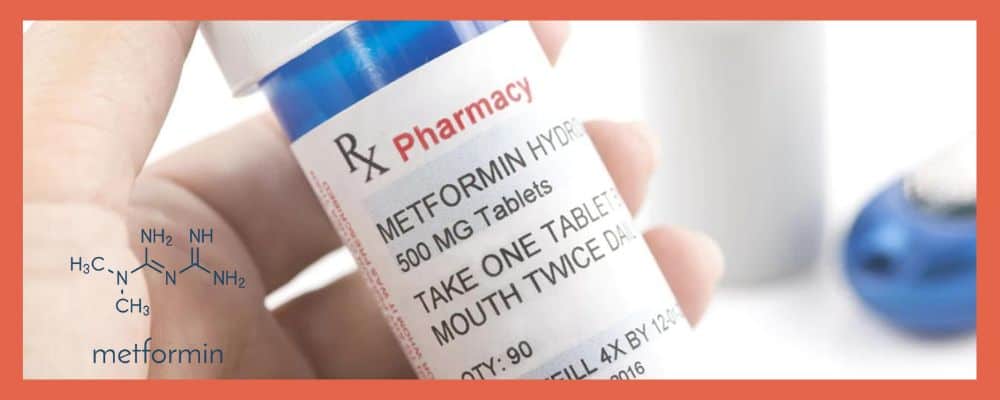
When incorporating berberine into your existing metformin regimen, the recommended dosage varies from one individual to another. That’s why it is essential that you consult with a healthcare professional before beginning any new supplement routine – especially if you are taking metformin.
By evaluating factors such as current health status and medical history, they can determine the correct dosage of berberine for your specific needs and goals.
Final Words. Is it Better to Take Berberine or Metformin?
Recent studies have demonstrated that Berberine has a positive influence on some indicators of aging, such as blood sugar and cholesterol levels. On the other hand, Metformin is an FDA-approved medication used mainly to treat Type 2 Diabetes but also exhibits anti-aging capabilities by activating AMPK and promoting longevity.
Metformin and berberine have been utilized for many years to treat diabetes, yet are fairly new additions to the longevity treatment field.
Though their exact modes of action may differ slightly, they share a number of similarities – so much so that in some circles within the aging community, berberine is viewed as an alternative form of metformin.
Nevertheless, it’s time we dive into both treatments further and explore how they might be valuable assets on our journey toward living longer lives!
It makes sense to many as to why berberine is regarded as a potential treatment for diabetes; after all, both metformin and berberine have been used in various forms over the centuries.
